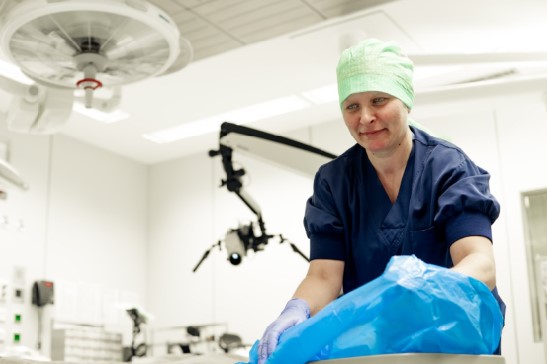‘Biocleaning‘, now there’s a confusing technical term. And no, we’re not talking about a cleaning technique that uses organic products only! Biocleaning is a sanitising technique which consists of cleaning, then disinfecting, an indoor environment and/or a surface. With biocleaning, contaminations are avoided and potentially infectious microbiological elements destroyed.
When is biocleaning used?
Biocleaning is used in what are known as ‘sensitive’ places. In those places the levels and development of micro-organisms must be under total control. It is, therefore, vital in the medical-social sector, be it hospitals, clinics, blood transfusion centres or care homes. Biocleaning is also applied daily in the pharma, cosmetics, aquatic (swimming pools, etc.) and agro-industry sectors which must operate under strict health and hygiene rules and standards, both in terms of the processes which must be implemented and expected results.

Cleaning Masters and biocleaning
For over two decades Cleaning Masters has been the cleaning partner of numerous hospitals and care institutions. With expertise, Cleaning Masters ensures perfectly clean rooms. A properly disinfected operating room or lab is literally a matter of life and death in a hospital.
Cleaning Masters has also built up the necessary know-how in the pharmaceutical sector. Many pharmaceutical companies, labs and research centres all over Belgium call on our masters for the cleaning of their clean rooms and related delicate areas. Our trained and motivated employees are sometimes even authorised to give training to the client’s new staff. In this way, in total partnership, they ensure that the GMP (Good Manufacturing Practices) guidelines are correctly observed.
How is it carried out?
In most cases, a biocleaning process is carried out in three steps.
- Cleaning agents remove adhering and loose particles, dirt and microorganisms.
- The area is wet mopped or brushed and detergent loosens dirt.
- A disinfectant with biocide ingredients destroys the micro-organisms.
Biocleaning can only be carried out by specialist cleaners, on two types of ‘organs’. An environment’s boundaries (from the floor to the ceiling, including the walls) and furniture within the environment. However, because 80% of the contaminants come from humans, biocleaning must be applied in compliance with basic hygiene rules: hand washing; protective clothing (hair net, gowns and overshoes, etc.). The latter must be put on in a specific order, in a separate, secluded area.
What is an efficient biocleaning process?
Biocleaning adheres to the Sinner Circle method. That is a system which combines and structures the various steps of a cleaning procedure to ensure the most efficient results possible. The procedure is based on the balance between four necessary factors:
- temperature;
- mechanical power;
- chemistry;
- contact time.
If one of the fours factors decreases, it must be compensated by an increase in another factor to meet the necessary conditions to eliminate certain biological elements.
Before a biocleaning procedure can be set up, strict specifications are established by each client depending on their job and needs. A biocleaning specialist will then apply the necessary methods (manual and/or equipment-based procedure) and tools (cold or hot water, steam, product with an adapted pH) to carry out the procedure.
The specialist draws up method sheets. They outline the procedure and detail regular and more specific actions to be carried out, depending on the environment in question. The method sheets will be very useful for each cleaning agent who will be working in the area and who needs training and authorisation before being able to do so. Tests and monitoring are carried out during a biocleaning procedure (before, during and after cleaning) to confirm that the procedure, and its effectiveness, comply to standards.
Prevent rather than cure
“Our job is to get rid of what’s invisible! We set up guidelines to ensure that infections and contaminations are avoided. In a nutshell, biocleaning is all about preventing, rather than dealing with, disasters”, says Christophe Leloutre, bio-cleaning specialist from our French parent company Samsic.
